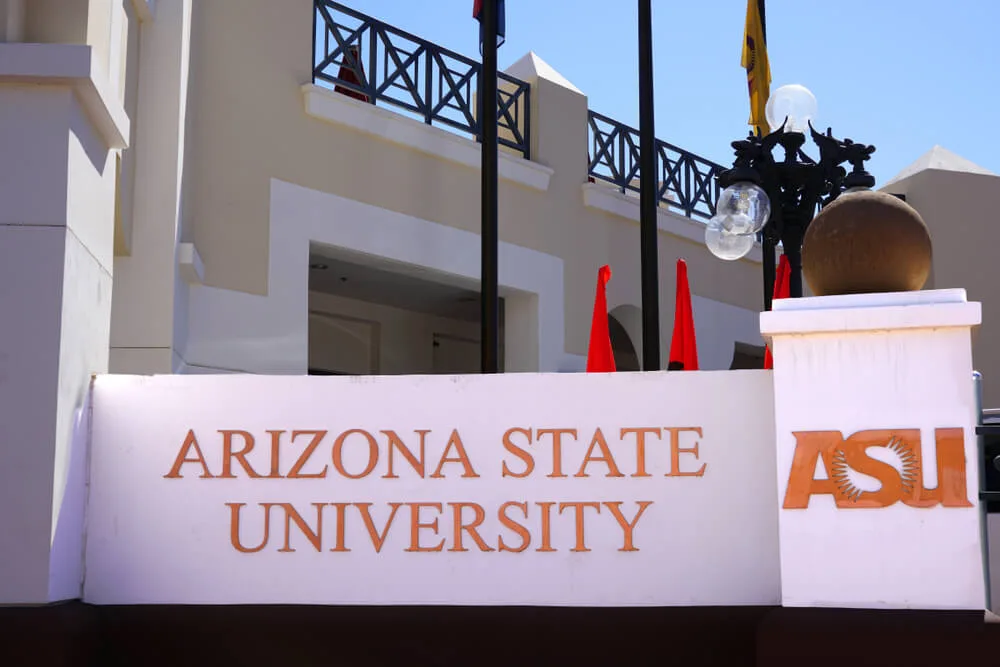
Photo via Getty Images
Faculty, staff, and student workers at Arizona’s largest public university are unionizing.
Arizona State University announced Thursday that it would join the University of Arizona as part of the United Campus Workers of Arizona, a local chapter of the larger, national Communication Workers of America.
UA went public about the union earlier this year, calling it Arizona’s first “wall-to-wall” statewide union for university campus workers.
The United Campus Workers of Arizona currently has 500 members. Across the country, CWA represents 30,000 members in higher education in more than 15 states.
Sandy Soto, an associate professor at UA and a spokesperson for the union, told The Copper Courier that the university decided to unionize earlier this year after the pandemic highlighted problems in the university’s structure and how it was making decisions.
“The pandemic really brought into sharper relief how little regard the upper administration of our university has for workers,” Soto said.
Soto said the move also came after years of decisions by the state to disinvest in public education.
After the announcement to unionize, The Arizona Republic reported that UA President Robert Robbins supported the faculty’s decision.
A press release from ASU’s union organizing committee on Thursday said they were unionizing to address long-term concerns like job security, wages, benefits, and to advocate for “increased state support for public higher education.”
“Today’s step to launch a union for all workers at ASU stems from the shared desire to unite our voices for positive change,” the statement read. “We have all experienced constant change at work this year, but not for the better.”
The move was also promoted by the ASU Community of Care Coalition, which formed earlier this year to protest the decision to reopen for in-person classes amid the coronavirus pandemic.
Jenny Brian, a Honors Faculty Fellow at ASU’s Barrett Honors College and a member of the Coalition, said Friday that the group formed to lobby the university for more transparency in its decision making.
The group was largely ignored, she said.
While the Community of Care Coalition and the union are two separate entities, Brian said Friday that she sees the union as a way to legitimize the goals of the Coalition and work together to enact change.
“People can read about union wins, they can read about the possibilities of what happens when we work together,” Brian told The Courier. “It’s tangible and it’s real.”
What does a union mean for Arizona’s universities?
Arizona is a right-to-work state, meaning university employees do not have to join the union.
University employees who opt to join the union will pay dues, which are calculated based on individual salaries. Dues will range from $8 to $60, according to the union’s website, and will support training, lobbying, professional support staff and other resources for the union.
While the right to unionize is protected under Arizona state law, the Arizona Board of Regents, the governing body that oversees Arizona’s three public universities, cannot grant collective bargaining rights to university employees because of its status as a public employer.
As a result, even with a union, employees at Arizona’s three universities won’t be able to meet and confer with ABOR or university administrators to bargain over their contracts.
But employees can negotiate better working conditions in other ways, and Soto says UA went into the process of forming a union with “eyes wide open.”
University employees did extensive research before unionizing and ultimately settled on CWA after seeing the wins the union was able to secure at other universities, Soto said.
In 2017, the University Campus Workers of Tennessee used rallies, press conferences, editorials and town halls to successfully force the University of Tennessee system to opt out of privatizing and outsourcing janitorial jobs, according to reporting from In These Times.
Soto says UA’s union was methodically working through a list of the roughly 16,000 university employees, from custodians and groundskeepers to student workers, to educate them about the union and to gauge how the union could advocate for them.
Despite the inability to regularly confer with the universities about their employees contracts, United Campus Workers can still organize, collect dues and put pressure on leadership to change their ways of doing business, Soto said.
“That’s what we intend to do,” she said.

He said what? 10 things to know about RFK Jr.
The Kennedy family has long been considered “Democratic royalty.” But Robert F. Kennedy, Jr.—son of Robert F. Kennedy, who was assassinated while...

Here’s everything you need to know about this month’s Mercury retrograde
Does everything in your life feel a little more chaotic than usual? Or do you feel like misunderstandings are cropping up more frequently than they...

Arizona expects to be back at the center of election attacks. Its officials are going on offense
Republican Richer and Democrat Fontes are taking more aggressive steps than ever to rebuild trust with voters, knock down disinformation, and...

George Santos’ former treasurer running attack ads in Arizona with Dem-sounding PAC name
An unregistered, Republican-run political action committee from Texas with a deceptively Democratic name and ties to disgraced US Rep. George Santos...




